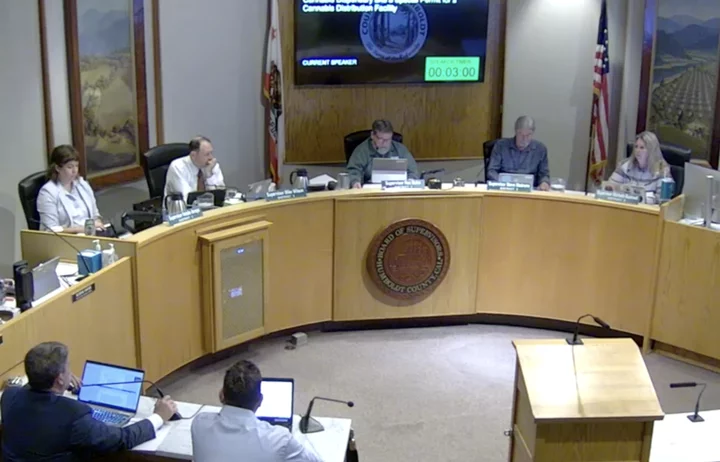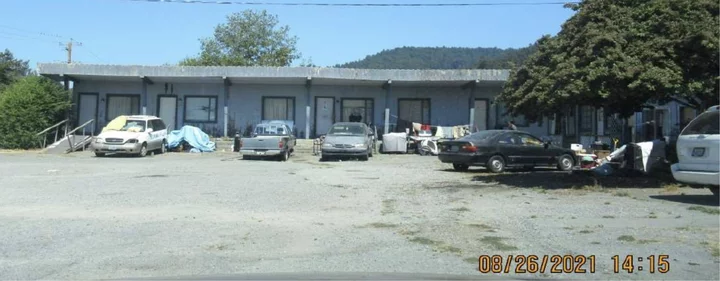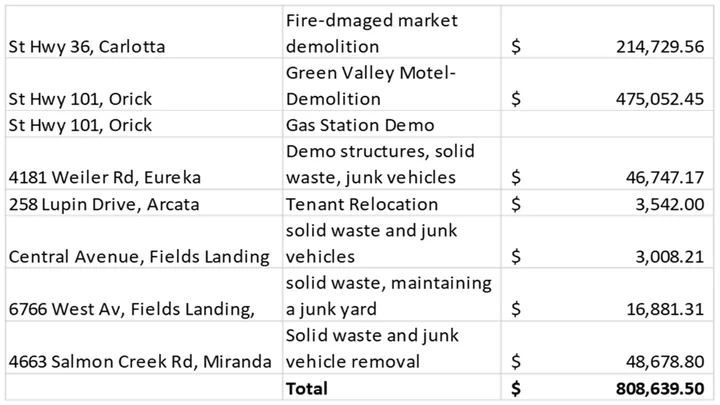Screenshot of Tuesday’s Humboldt County Board of Supervisors meeting.
###
Despite ongoing staffing constraints, Humboldt County’s Code Enforcement Unit (CEU) has made significant progress in recent years resolving longstanding issues on nuisance properties across the county.
At today’s Humboldt County Board of Supervisors meeting, Code Enforcement Manager Dean Beck presented the CEU’s annual report for 2023. Beck pointed out a “steady decline” in unassigned code enforcement cases, which have decreased from 450 in 2020 to just 88 this year, thanks to “improved processes and procedures” within the unit. All told, the CEU closed 176 percent more cases in 2023 than were opened, he said.
“One of the things that we looked at was [how] cases were being assigned,” Beck explained. “Late in 2023, [we] did an assessment of open [code enforcement] cases by APN [assessor parcel number] to identify how many open cases there were, to whom they were assigned, and to provide a method of assigning new cases. This is a similar method to how building inspections are assigned to inspectors. … Using the new process, the CEU should be more efficient when doing inspections and can visit several properties in a certain area in one outing. This will save both time and fuel.”
However, staffing has proven to be challenging, Beck said. The CEU lost nearly 40 percent its staff in 2023. “All of these contributed to an increased workload by the remaining team members,” he said. “The number of staff has been reduced from 13 to 8. With this reduction in staff, work must be prioritized and the volume of cases that can be addressed simultaneously has been reduced.”
In 2023, the CEU set up a multi-agency task with the Sheriff’s Office, the Environmental Services Division of the Department of Health and Human Services (DHHS), the Planning and Building Department, Public Works and County Counsel to address some of the county’s most “difficult” properties.
Seven properties required county abatement in 2023, including the Green Valley Motel and nearby gas station along Highway 101 in Orick. In 2021, the county deemed the motel uninhabitable due to extremely poor living conditions. The deteriorating condition of the motel made it a candidate for abatement, Beck said, but a pending real estate transaction postponed the process. In January 2022, a fire erupted at the adjacent gas station, destroying both buildings. The abatement process, completed in May 2023, cost the county $475,052.
Before | Screenshot
After | Screenshot
The CEU abated five other nuisance properties, including the old Judy’s Market on Highway 36 in Carlotta, a property on Lupin Road in Arcata, an uninhabitable mobile home on Weiler Road in Eureka, two garbage-strewn properties in Fields Landing, and a property with numerous abandoned vehicles and solid waste issues on Salmon Creek Road in Miranda, as seen in the breakdown below.
Screenshot
The county has at least two multi-agency cases coming up, Beck said, including one in Stafford and another at Yee Haw, a longstanding communal living property on Quarry Road near Trinidad. “Both of these cases are from 2012,” he continued. “It should be noted that a proposed amendment to the [tiny home] ordinance that would benefit the owners of the Quarry Road [property] has been in the works.”
Switching focus to cannabis enforcement, Beck noted that illegal outdoor grow operations have become nearly non-existent due to significant advancements in aerial imagery technology. “The success of the cannabis abatement program cannot be overstated,” he said. “The volume of outdoor cannabis cases continues to decline.”
In 2023, the CEU’s cannabis team opened 41 new cases and closed 136, 121 of which were from previous years, Beck said. In conjunction with the Sheriff’s Office and the California Department of Fish and Wildlife, the CEU issued 29 warrants resulting in 29 new cases.
The board’s comments generally revolved around the need for more proactive enforcement of nuisance properties. First District Supervisor and Board Chair Rex Bohn urged staff to use their enforcement tools to address minor issues early on, preventing them from escalating into prolonged abatement problems.
“If they’re not going to clean it up in 12 months and they’re not going to pay any the fees in 12 months, they’ve pretty much committed to not paying for the next two years,” he said. “[Y]ou should make one trip, give then them the warning second trip, and if they’re not going to do it, then we start the [legal] process. But numerous trips of telling them to clean up, and they say they’re going to clean up but they never do.”
Similarly, Third District Supervisor Mike Wilson expressed concern for the time and money being spent on abatement and suggested property owners recoup some of the cost.
“I think that we need to figure out ways to have some of those property owners be more financially responsible for all the efforts that we’re using,” Wilson said. “We need to be equitable in the way that we provide these services across the county. … If we’re doing abatements that cost more than the property’s worth, we were never going to recoup that money and [it’s] just footed by the public.”
Planning and Building Director John Ford said the CEU is working to change its overall approach in dealing with enforcement. “To be blunt, we’re finding that constant pressure on property owners is the way that things get done,” he said. “You can’t just send them a letter and hope that they’re going to deal with it if you’re not talking to them almost every day, in their face. It sounds kind of blunt, but that’s where the change gets made.”
Bohn asked if the enforcement process was entirely complaint-driven or if CEU staff have the authority to open a case on a property. “Are you able to drive by a house and go, ‘Oh my god, I’m glad that’s not my neighborhood!’ and put it on the books or open the case?” he asked. “Or do you have to get a call from a neighbor?”
Ford said he could look into it, but emphasized that “there is a fine line with enforcement.” If there is not a complaint on record, the county could be accused of discriminating against an individual,” he said. “It’s far easier for the county to defend a position that is complaint-based [because] it’s not something that anybody in the department or any individual had against somebody else and just decided to get revenge or something.”
Fifth District Supervisor Steve Madrone also brought up the issue of enforcement at homeless encampments and the possibility of a sanctioned encampment, noting that there has been a surge in camps around the McKinleyville area since Devil’s Playground was dispersed in 2016.
“I know Eureka tried hard to try and figure that whole puzzle out and it was not easy,” Madrone said. “Frankly, it probably would have been better just to bring services and sanitation [on site] because what we’ve done now is dispersed [people] all over the place. Pretty much any wooded area in McKinleyville has homeless camps, and I get calls constantly from the neighbors very upset about it. [They are] very concerned for the safety of their children and the perception of danger, and in real cases, some cases real danger from folks doing drugs and other kinds of things. Not that all homeless people are because many of them are just down on their luck.”
Fourth District Supervisor Natalie Arroyo, who sat on the Eureka City Council at the time of the Palco Marsh evictions, said she didn’t “want to go too far down the rabbit hole,” but acknowledged that it was a “very difficult time for all of our communities.”
“[The eviction] was necessary to relocate people so that the Humboldt Bay Trail could be constructed there,” she said. “Not only did folks relocate elsewhere in Eureka, but they relocated to the Samoa Peninsula and a number of other places. I’ve seen the impacts of that, but I’ll just say from my perspective – because it does intersect with code enforcement and sanctioned camps – we did have … a number of sanctioned camps that were rotating between different sites … . But they were, I would say, by and large not a success.”
Arroyo said she would support “something like that in the future” if the county was able to identify a robust funding stream to support it.”
After a bit of additional discussion Second District Supervisor Michelle Bushnell made a motion to approve the report, which was seconded by Wilson. The motion was approved 5-0.
DOCUMENT: Code Enforcement Unit Annual Report: 2023
###
Other notable bits from today’s meeting:
- The Planning and Building Department will be closed on Fridays for the foreseeable future. The board unanimously approved staff’s recommendation to reduce the department’s public counter hours to Monday through Thursday, from 8:30 a.m. to 2 p.m. to give staff more time to focus on their workload. “Managing the public-facing counter and working on online projects simultaneously has proven challenging due to erratic flow of customers at the counter,” according to the staff report. “Dedicating staff time to these activities will allow staff to concentrate and reduce project turnaround time.” The item was unanimously approved along with the rest of the consent calendar.
- The board also received an annual report from the Humboldt-Del Norte Film Commission. Cassandra Hesseltine, the executive director of the commission, touted the organization’s success in bringing several big motion pictures to the region in recent years. Hesseltine said film productions have brought in $12.4 million “direct dollars” to the region since 2011. The board did not take any action on he item but agreed to accept the report.
- The board also approved staff’s request to revoke conditional use permits for two connected Redway businesses – the Country Club dispensary and Grass Roots Distribution – at 3525 Redwood Drive. “This is not controversial,” Ford told the board, noting that the permit holder hasn’t been in touch with staff since last year and is rumored to have skipped town. He recommended that the board revoke the permit to allow another applicant to take over the space. The motion was unanimously approved 5-0.
And if that’s not enough local government for ya, you’ll want to check out the Outpost’s coverage of Monday’s special budget hearing here.




CLICK TO MANAGE